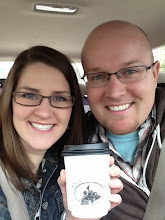As I sit here at Java Hut sipping my Blended Mocha and writing a short essay/review for my women's ministry class, my mind wanders to my blog and my friends and family back home. I thought I'd give ya'll a little glimpse into my homework... fun fun, eh???
Each week, as I read assignments, I have to write a quick review over the reading to turn in. Our professors used to use the honor system where students could just check off that they had done the reading, yet they have recently decided to not do that anymore. So now, in most of my classes I have to either write about what I read or take a weekly quiz on it.
This week, I had to read a chapter in Piper and Grudem's "Big Blue Book," "Recovering Biblical Manhood and Womanhood" for my women's ministry class. In my review I had to summarize the content of the chapter and then how what I learned can be used in ministry today. I mainly focus on one section of the chapter, since there are many. It is a simple, quick assignment but I thought I would share it. :-) Enjoy!
Reading Reflection #3
In chapter eleven, “The Valuable Ministries of Women in the Context of Male Leadership,” Thomas Schreiner spends the first half of the chapter bringing to the table various arguments that feminists and egalitarians purport to “prove” that women have full function in church leadership; equal in every way to men. The second half of the chapter, he refutes each claim by showing the truly biblical mindset concerning these issues.
Pulling from the lives of different women in the Bible, egalitarians claim the following roles of women in the church: prophetesses, teachers, fellow-workers and laborers, deacons, elders, and apostles. Coming from a complementarian mind-set, at first glance one can wonder how they see these positions as even options for women. Yet, after reading Schreiner’s essay, if a person has no background in correct biblical understanding, these claims can seem very convincing!
The argument for prophetesses caught my attention. Deborah is the primary example that is used to say that women can be prophetesses. She was a judge in Israel and there is record of an instance where she gave instructions to Barak, who was a commander of Israelite troops
[1]. However, Schreiner later points out that even though Deborah gave him instruction, she did not do it in front of a crowd but rather pulled him aside and instructed him in private. As Schreiner states, “Note that Deborah did not go out and publicly proclaim the word of the Lord. Instead, individuals came to her in private for a word from the Lord.”
[2] The complementarian argument is not that women cannot prophesy, rather it is how they prophesy. First Corinthians 11:2-16 gives instructions for women who prophesy that they are to cover their heads, implying their submission to their husbands and the Lord. “Paul affirms that women can prophesy, but even in the process of prophesying they are to do so in a manner and with a demeanor that will not violate male headship.”
[3] The goal in women’s interchurch roles is not to suppress them, rather, that they understand their serving is to be done under God-ordained, humble male leadership
Schreiner also points out that in the Old Testament women were prophetesses but never were they priests. “A prophet, therefore, does not hold the same office as a teacher. Prophets speak forth God’s revelation to the people, but the people go to the priests in the Old Testament to receive authoritative instruction based on tradition…. It is the priests who had the more settled and established positions of leadership in Israel.”
[4] Once again, the argument is not that women cannot advise according to the will of the Lord, or that God did not use women to speak forth His truth, rather it is the manner in which it was done and the fact that it was always done in accordance with the biblical helper model and role for women.
There is great truth in this understanding for our churches today. Even though many people believe that the general gift of prophecy has ceased, there is a second form of prophecy used in scripture and that is the “forth-telling” of God’s truth. We as women are called to daily “forth-tell” God’s goodness in our lives and to use that as a tool in counseling, witnessing, and ordinary conversations. (2 Tim. 4:1-5, Titus 2:3-5) However, this is a high calling because in order to share this with others, we need to be submersed in the truth ourselves! How can we teach what we ourselves do not know?
Questions:
1. How can we better train women to know and understand the word of God so that they can “forth-tell” this to an unbelieving world?
2. What egalitarian lies have women in our church taken as truth and how can we re-train them to think biblically?



3 comments:
Thank you for sharing. I learned a lot form reading this. Look forward to learn more from your classes. Keep posting!!
Solange
Sounds like you are studying hard! Keep at it! :)
Good job Michelle. I enjoyed reading y0ur article and am grateful for all you are learning. Keep on! What a wonderful opportunity you have in front of you.
Post a Comment